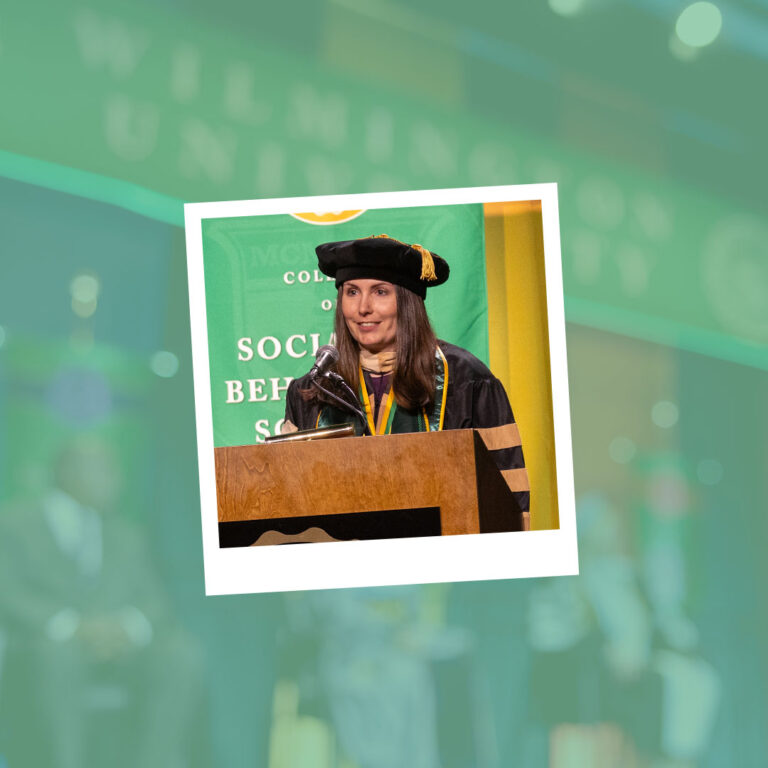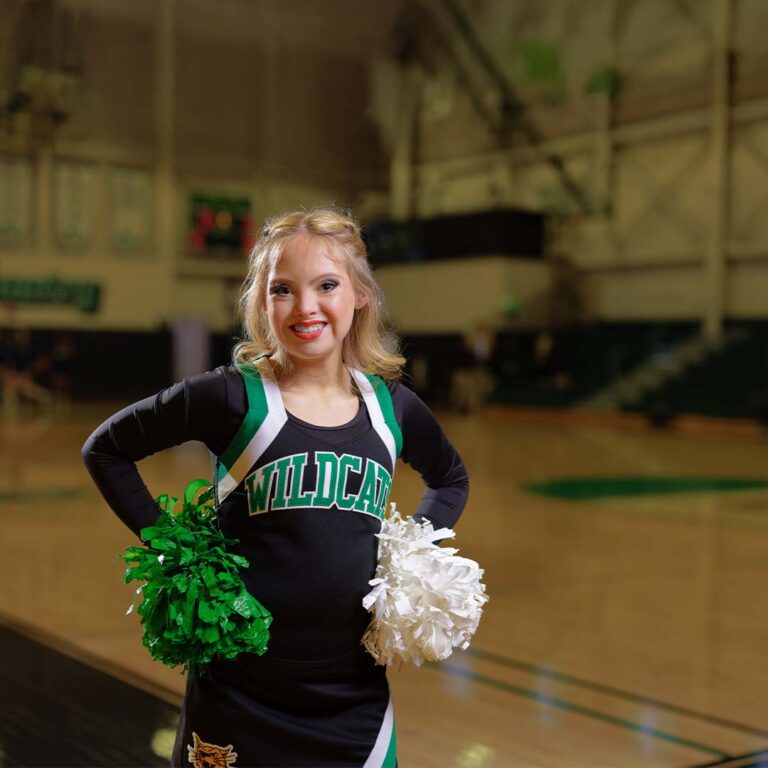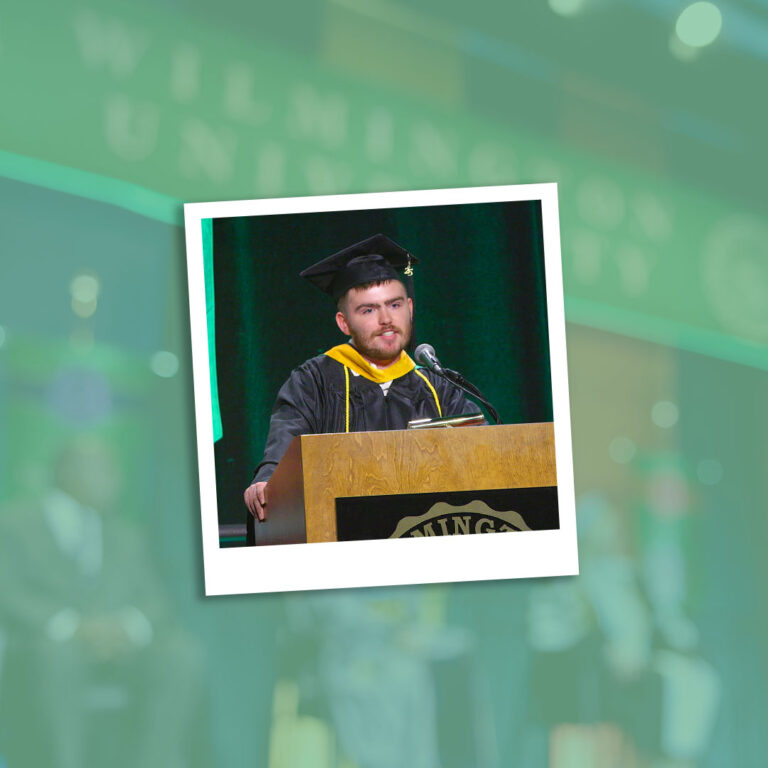Brittany Lewis: Building a Legacy that Honors African-Americans’ Past, Present and Future
WilmU alumna Brittany Lewis is an activist and educator who is making her voice heard. Whether it’s in boardrooms, college campuses or on social media, she captivates audiences and makes them think.

On August 22, 2017, she used that voice to speak against domestic violence, a plea so passionate that she won over judges of the Miss Black America pageant and took the crown. (She joined the ranks of Oprah Winfrey, who participated in the pageant in 1971, representing Tennessee.)
Lewis had been in pageants before; she was named Miss Delaware in 2014. But for her, the title of Miss Black America was more significant. It aligned with her passion for highlighting the African-American experience in America.
“In my overall experience with pageants, there are plenty of times where I was told that my social commentary or ideas were a bit too political,” says Lewis. “But at Miss Black America, by ideas were welcomed. I was able to speak unapologetically about issues affecting my community.”
Aligning Legacies
At 21, Lewis entered the Miss America pageant to help cover tuition for her undergraduate program at Temple University. She had no formal training and didn’t place, but she did win $1,000 in scholarships in the congeniality category.
She thought her career in pageants had ended with Miss America but stumbled upon information for the Miss Black America enterprise while conducting research for her Ph.D. program at Georgetown University. She’s in her third year of study, and her research interests include 20th-century African-American history, cross-cultural solidarity movements and city-suburb formation. She was intrigued with the Miss Black America program, particularly its origin, purpose — and on a more personal note, its proximity to Atlantic City, where her parents worked for more than 30 years.
In 1968, the most famous demonstration against Miss America was the liberation picket, in which more than 400 women’s liberation and civil rights activists stormed the Miss America pageant along the Atlantic City Boardwalk and protested the pageant’s repressive ideal of feminism. While there were “freedom trashcans,” banners, and megaphones, there was a quieter demonstration happening directly across the street that focused on racial inequality.Miss Black America was a form of protest against the Miss America pageant, which implemented rule No. 7, stating that “contestants must be of good health and of the White race.” (Miss America finally featured a black contestant in 1970.)
Philadelphia entrepreneur and Miss Black America creator J. Morris Anderson staged the event the same night to create a safe space to embrace African-American women’s beauty and their role in America. According to its website, Miss Black America Today remains “ever committed to the empowerment of women of color throughout America, representing all of our sisters of the African Diaspora.”
Lewis was drawn to the concept and decided to take part. “It’s not enough to continue to break barriers and solidify spaces in organizations that initially barred us from participating,” says Lewis. “It’s about reaffirming the importance of institutions created for us and by us.”
Making a Statement
After earning her bachelor’s at Temple, Lewis was selected from some 50,000 applicants nationwide to be part of the competitive Teach for America program. During her years of service, the state of Delaware awarded her the Teacher Cooperative/Retention Award for outstanding dedication and success in the classroom.
She found her calling as an educator and critical thinker. She openly questioned diversity concerns regarding the organization’s recruitment population and lack of culturally responsible classroom materials, and what the implications would be if those issues remained unresolved. Because she had a voice and wasn’t afraid to use it, the Teach for America regional team asked for her assistance with cultural competency training and classroom materials.
Her opinions also would inspire a new Ethnic Studies course at WilmU.
Lewis had earned her master’s in Secondary Education at WilmU, maintaining a 4.0-GPA. By then, she had been working full-time at Prestige Academy Charter school in Wilmington, and thanks to WilmU’s flexible options, was able to complete her degree while teaching.
In 2015, WilmU’s College of Arts and Sciences Dean Dr. Doreen Turnbo invited Lewis to draft a curriculum that explored the complexities and history of African-American women. Lewis also worked with Kate Cottle, assistant professor and the college’s chair of Humanities and Literature, to bring Ethnic Studies: The Black Woman (ETN 338) to fruition. Lewis calls Cottle a mentor.
Cottle was equally enthusiastic about the project. “The course fulfilled the mission of the University, in terms of addressing diversity,” says Cottle. “African-American women have a history and culture that can sometimes be hidden by the forces of racism and sexism. This class is for any student who doesn’t know about the richness and depth of African-American’s women’s history and how that history informs and contributes to the tapestry of American culture as a whole.”
ETN 338 is now in its third year, and Lewis teaches it online. Cottle wishes she could take the class herself.
“Brittany is highly engaging and allows space for a broad-ranging conversation,” she says. “She’s given me sources, like Geneva Smitherman, that have changed how I think about language in culture.”
Personal, Not Political
Lewis wears many hats these days.
She spends much of her time working on her pageant platform of domestic violence. Sadly, her older sister, Gina Nicole Clarke Lewis, was a victim of domestic violence, and passed away as a result in 2010.
“Unfortunately, my sister’s story is not an isolated one,” says Lewis. “There are millions of women around the country that live in fear and violence that are still searching for a way out. I will tirelessly serve her memory through community outreach. No family should have to experience the pain of losing a loved one {this way}.”
Lewis has crafted a three-pronged approach that includes communication, education and legislation designed to help reduce domestic violence issues. She visits high schools and colleges to promote healthy relationships and make students aware of the signs of domestic abuse.
She is also committed to increasing African-American education. Her initiative, “Returning to our Roots: Liberation Through Education” strives to reclaim and celebrate the Black narrative.
Lewis hopes to become a full-time, tenured professor at a major university.
“I find that understanding my history, culture and narrative is very liberating,” she says. “I want to disseminate what I learn and offer that same liberation to others who have yet to learn the power of who they are.”



